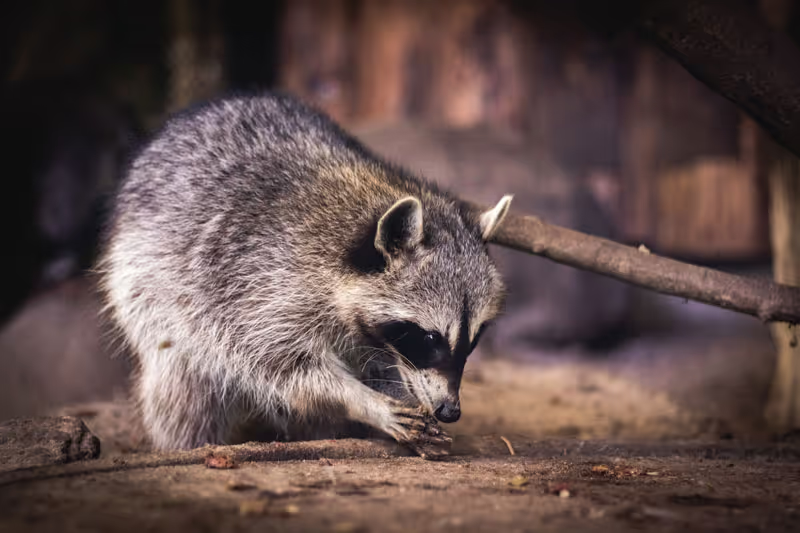Raccoon Ramblings



My dog and I go on walks most mornings and lately, our routine tends to interrupt a group of raccoons at their favorite breakfast spot. Their beady little eyes seem to stare at us from behind masks as they use their hand-like paws to scarf down the scraps they occasionally share with a few neighborhood cats.
Raccoons are native mammals that prefer to live in forested areas near streams, lakes, or other water sources, but are common in many different environments throughout Washington State including neighborhoods and urban areas. They typically measure three feet long, including a long and bushy tail, and weigh between 15 to 40 pounds (but large males have weighed up to 60 pounds!). The trademark black “mask” around raccoons’ eyes helps to absorb incoming light and makes it easier for them to see at night, when they are most active and when garbage cans are easiest to raid.
Like the gourmandes in my neighborhood, who seem to have a plentiful supply of pet food and easy access to garbage cans, most raccoons are never far from their next meal. This is largely due to the fact that they are both highly intelligent and will eat just about anything. Raccoons are omnivores and enjoy both vegetation and meat, along with most other foraged treats. Their nimble, five-fingered forepaws can reach food other animals cannot. While raccoons do not have opposable thumbs, they are able to grasp objects with reasonable strength and extreme dexterity. No garbage can, cooler, or chimney is safe from their skilled paws!
It may seem like raccoons put their advanced tactile abilities to use in order to eat, but this is only part of the picture. Compared to most animals, raccoons have four to five times more sensory cells in their paws. 75% of the part of their brain that processes sensory signals is devoted to touch. When raccoons handle items, they are gathering sensory information and “seeing” them. Raccoons will wet objects and food in order to heighten their sense of touch. Water on a raccoon’s hands provides more sensory information to work with and helps them gain a better sense of the object they’re holding onto. This process of “dousing” often gets mistaken as washing (the North American Raccoon’s species name is procyon lotor and lotor means washer in Latin).
Thanks to their remarkably adaptable nature and above average intelligence, raccoon populations in North America have seen an “astonishing” surge over the past 80 years. A study of city-dwelling raccoons outfitted with GPS collars showed them avoiding major roads, as if they had learned to stay away from cars. Other studies have shown raccoons creatively gaining access to food in various hard-to-open containers. As they maneuver through their increasingly human world, raccoons seem to be learning more about us, and how to live alongside us.
Sources
Photo by noaheleazar on Unsplash
Copeland, Libby. “Will Raccoons Trump Rats as the Ultimate Urban Mammal?” Slate, https://slate.com/technology/2016/09/raccoons-are-taking-over-urban-environments.html. Accessed 25 July 2021.
“Raccoons (Procyon Lotor).” Washington Department of Fish and Wildlife, https://wdfw.wa.gov/species-habitats/species/procyon-lotor#desc-range. Accessed 25 July 2021.
Traver, Tim. “Raccoons: It’s All in the Hands.” Northern Woodlands, https://northernwoodlands.org/outside_story/article/raccoons-hands. Accessed 25 July 2021.
Wei-Haas, Maya. “5 Surprising Raccoon Superpowers.” National Geographic, https://www.nationalgeographic.com/animals/article/raccoon-climbing-building-intelligence-facts-animals. Accessed 25 July 2021.
© Holly Duffy, July 2021
Touch whale bones, examine shipwreck artifacts and connect with the coast's living history.

Support our mission, get involved in educational programs, or contribute through donations and volunteering.